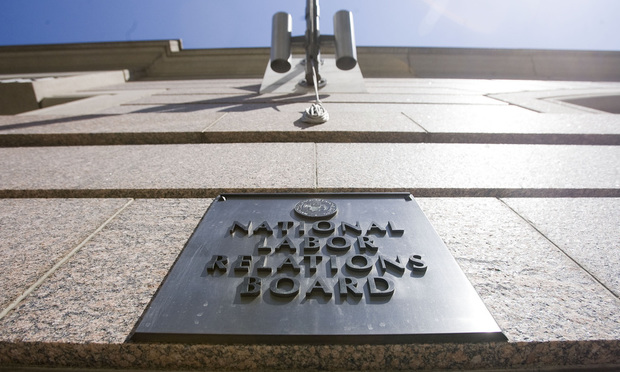New Report Looks at Rise of Class Action Bans in Employment Contracts
Nearly 65 percent of workplaces where the average wage is less than $13 an hour also require mandatory arbitration agreements for their employees, according to the Economic Policy Institute report. The U.S. Supreme Court this term is looking at these agreements in action that involves the NLRB and private companies.
April 06, 2018 at 02:41 PM
4 minute read
 National Labor Relations Board in Washington, D.C. Credit: Diego M. Radzinschi/ ALM
National Labor Relations Board in Washington, D.C. Credit: Diego M. Radzinschi/ ALM
Employees in low-wage workplaces, women and African-Americans are more likely to be subject to mandatory arbitration agreements in employment contracts than other groups, potentially limiting their access to the court system, a study released Friday by the Economic Policy Institute found.
The survey authored by Cornell University professor Alexander Colvin found that 57.6 percent of female workers, 59.1 percent of African-American workers and 53.5 percent of male workers are bound by mandatory arbitration agreements.
Nearly 65 percent of workplaces where the average wage is less than $13 an hour also require mandatory arbitration agreements for their employees.
Colvin's study also found that since 1991, the existence of such agreements has risen from just over 2 percent to nearly a quarter in the early 2000s, to more than 55 percent of workers today, which he says lessens the access of employees to the courts for a variety of civil rights and labor rights claims, representing a “dramatic and important shift in how the employment rights of American workers are enforced,” according to the report.
Mandatory arbitration agreements are most widespread in California, Texas and North Carolina. In all of the 12 largest states by population, more than 40 percent of employers have these policies, the survey found.
The issue draws significance as the U.S. Supreme Court weighs a trio of cases that challenge whether class action waivers should be allowed in employment contracts. Mandatory arbitration agreements have also found new scrutiny amid the #MeToo movement, as women speak out against past workplace abuses and the efforts of employers to keep those issues out of court.
“Under such agreements, workers whose rights are violated—for example, through employment discrimination or sexual harassment—can't pursue their claims in court but must submit to arbitration procedures that research shows overwhelmingly favor employers,” Colvin writes in the report.
The findings build off a 2017 study from the worker-friendly policy group that found more than half of private sector nonunion jobs are subject to mandatory arbitration, a trend the report found has accelerated since the 1990s. Among private-sector nonunion workers, 56.2 percent are subject to mandatory employment arbitration, which would mean more than 60 million American employees have no recourse to the courts in legal disputes and must go to arbitration, the survey found.
Larger employers were more likely to impose such agreements, which are different from the system used to resolve employment disputes between labor unions and management in organized workplaces. More than 65 percent of employers with 1,000 or more workers have mandatory employment arbitration, the study found.
Among the employers that require mandatory arbitration, 30 percent include class-action waivers that prevent them from taking collective legal action, according to the report.
The Supreme Court heard arguments in October, in a trio of cases—National Labor Relations Board v. Murphy Oil USA, Ernst & Young LLP v. Morris and Epic Systems v. Lewis—that consider whether the class action waiver violates the federal law that protects workers' rights.
Colvin said a ruling in favor of the employers would encourage more businesses to adopt mandatory employment arbitration and class action waivers.
The U.S. Chamber of Commerce's amicus brief, filed by a team from Mayer Brown, urged the Supreme Court to uphold the lawfulness of mandatory arbitration.
“Most workplace grievances are individualized and therefore could not be pursued as part of a class or collective action. Indeed, without individual arbitration, most of those claims could not be pursued at all,” Mayer Brown's Andrew Pincus, counsel of record, wrote. “The best empirical data available show that employees fare at least as well in arbitration as in litigation, if not better; and that litigation in court is frequently too expensive to serve as a realistic option for employees seeking to vindicate their rights.”
This content has been archived. It is available through our partners, LexisNexis® and Bloomberg Law.
To view this content, please continue to their sites.
Not a Lexis Subscriber?
Subscribe Now
Not a Bloomberg Law Subscriber?
Subscribe Now
NOT FOR REPRINT
© 2025 ALM Global, LLC, All Rights Reserved. Request academic re-use from www.copyright.com. All other uses, submit a request to [email protected]. For more information visit Asset & Logo Licensing.
You Might Like
View All
NLRB Blisters Skilled Care Home Chain That Terminated Nursing Assistant Who Complained About Wages
6 minute read
Preparing for 2025: Anticipated Policy Changes Affecting U.S. Businesses Under the Trump Administration

Employers Race to File NLRB Petitions to Gain Upper Hand in Union Organizing
5 minute readTrending Stories
- 16-48. It’s Comp Time Again: How To Crush Your Comp Memo
- 2'Religious Discrimination'?: 4th Circuit Revives Challenge to Employer Vaccine Mandate
- 3Fight Over Amicus-Funding Disclosure Surfaces in Google Play Appeal
- 4The Power of Student Prior Knowledge in Legal Education
- 5Chicago Cubs' IP Claim to Continue Against Wrigley View Rooftop, Judge Rules
Who Got The Work
Michael G. Bongiorno, Andrew Scott Dulberg and Elizabeth E. Driscoll from Wilmer Cutler Pickering Hale and Dorr have stepped in to represent Symbotic Inc., an A.I.-enabled technology platform that focuses on increasing supply chain efficiency, and other defendants in a pending shareholder derivative lawsuit. The case, filed Oct. 2 in Massachusetts District Court by the Brown Law Firm on behalf of Stephen Austen, accuses certain officers and directors of misleading investors in regard to Symbotic's potential for margin growth by failing to disclose that the company was not equipped to timely deploy its systems or manage expenses through project delays. The case, assigned to U.S. District Judge Nathaniel M. Gorton, is 1:24-cv-12522, Austen v. Cohen et al.
Who Got The Work
Edmund Polubinski and Marie Killmond of Davis Polk & Wardwell have entered appearances for data platform software development company MongoDB and other defendants in a pending shareholder derivative lawsuit. The action, filed Oct. 7 in New York Southern District Court by the Brown Law Firm, accuses the company's directors and/or officers of falsely expressing confidence in the company’s restructuring of its sales incentive plan and downplaying the severity of decreases in its upfront commitments. The case is 1:24-cv-07594, Roy v. Ittycheria et al.
Who Got The Work
Amy O. Bruchs and Kurt F. Ellison of Michael Best & Friedrich have entered appearances for Epic Systems Corp. in a pending employment discrimination lawsuit. The suit was filed Sept. 7 in Wisconsin Western District Court by Levine Eisberner LLC and Siri & Glimstad on behalf of a project manager who claims that he was wrongfully terminated after applying for a religious exemption to the defendant's COVID-19 vaccine mandate. The case, assigned to U.S. Magistrate Judge Anita Marie Boor, is 3:24-cv-00630, Secker, Nathan v. Epic Systems Corporation.
Who Got The Work
David X. Sullivan, Thomas J. Finn and Gregory A. Hall from McCarter & English have entered appearances for Sunrun Installation Services in a pending civil rights lawsuit. The complaint was filed Sept. 4 in Connecticut District Court by attorney Robert M. Berke on behalf of former employee George Edward Steins, who was arrested and charged with employing an unregistered home improvement salesperson. The complaint alleges that had Sunrun informed the Connecticut Department of Consumer Protection that the plaintiff's employment had ended in 2017 and that he no longer held Sunrun's home improvement contractor license, he would not have been hit with charges, which were dismissed in May 2024. The case, assigned to U.S. District Judge Jeffrey A. Meyer, is 3:24-cv-01423, Steins v. Sunrun, Inc. et al.
Who Got The Work
Greenberg Traurig shareholder Joshua L. Raskin has entered an appearance for boohoo.com UK Ltd. in a pending patent infringement lawsuit. The suit, filed Sept. 3 in Texas Eastern District Court by Rozier Hardt McDonough on behalf of Alto Dynamics, asserts five patents related to an online shopping platform. The case, assigned to U.S. District Judge Rodney Gilstrap, is 2:24-cv-00719, Alto Dynamics, LLC v. boohoo.com UK Limited.
Featured Firms
Law Offices of Gary Martin Hays & Associates, P.C.
(470) 294-1674
Law Offices of Mark E. Salomone
(857) 444-6468
Smith & Hassler
(713) 739-1250







